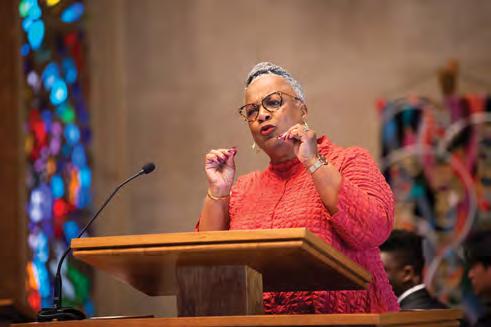
10 minute read
The Power of Dreaming Out Loud 1
Concerning the reality, relevance, and real power of dreams, former first lady of the United States, Eleanor Roosevelt, once said: “The future belongs to those who believe in the beauty of their dreams.” Harlem Renaissance Poet Laureate Langston Hughes once wrote: “Hold fast to dreams, for if dreams die—life is a broken-winged bird that cannot fly.” And world-renowned 19 th-century essayist, poet, and lecturer Ralph Waldo Emerson once penned: “Dare to live the life you have dreamed for yourself. Go forward and make your dreams come true.” 2
But the question is: “What is a dream?” A dream is a series of images, thoughts, or emotions passing through our minds while we are asleep! A dream is an involuntary vision while we are still awake! A dream is an awesome aspiration, a grand goal, or an enormous aim for our lives!
Advertisement
And both dreaming aloud and unabashedly living out our dreams can be dangerously audacious acts, as illustrated in the Hebrew Bible’s Genesis account concerning Joseph (Genesis 37 – 44).
On February 7, 2023, in the Oxnam Chapel of Wesley Theological Seminary, the 2023 Martin Luther King, Jr. Lecture, the Rev. Dr. Teresa Fry Brown masterfully delivered a powerful and thought-provoking message entitled “The Power of Dreaming Out Loud.” Within this lecture/sermon, Fry Brown (the associate dean of Academic Affairs and Bandy Professor of Preaching at the Candler School of Theology of Emory University) posed two very challenging questions: (1) What are we dreaming? and (2) What have we done about it?
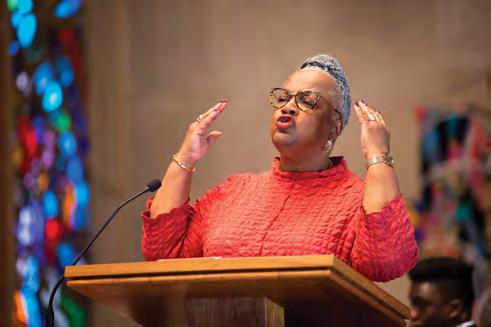
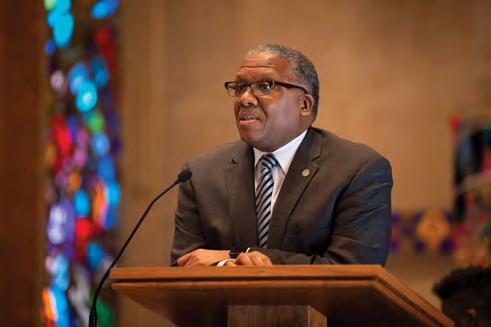
Anchored by the soulful musical renditions whois.net. Type in the domain name, and the website provides the contact information supplied by the domain name registrant.
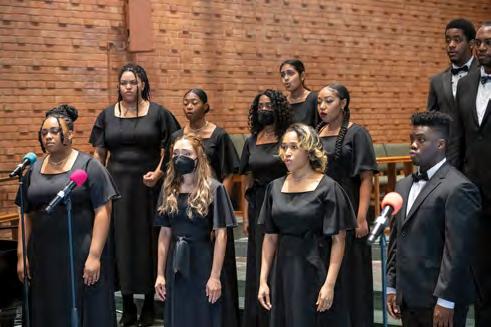
Be flexible about your business name. If your current choice is being used, try, try again. However, it is more important that you identify a name that you can trademark and also own the domain name – to make sure that you own you!
Trademark your name
Once you’ve completed the research, you’ll be ready to trademark your name to secure your rights to the name! We recommend hiring an intellectual property attorney. You can look for one in your area at National Black Lawyers (NBL) or ask your local chamber of commerce for recommendations. The cost for an attorney to file a trademark can range from $1,000 to $1,500, plus filing fees. You can also complete a trademark registration yourself at the U.S. Patent & Trademark Office at uspto.gov/ trademarks. Filing fees apply. ❏ ❏ ❏ of the amazing University of the District Columbia Chorale, Dr. Fry Brown assumed full charge of her sermonic lecture presentation. So much so that Dr. W. Antoni Sinkfield (WTS Associate Dean of Community Life) stated in his post-lecture remarks, “I could not tell if she had her shoes on or off (referencing Dr. Fry Brown’s quip that she lectures with her shoes on, but she preaches with her shoes off).” For experiencing Dr. Fry Brown’s lecture was indeed a unique experience in that it brought to bear the most significant and spectacular aspects of a brilliantly crafted scholarly lecture mingled with the prose and power of a profoundly imaginative sermonic reflection.
Throughout her presentation, Dr. Fry Brown poignantly paralleled the challenging aspects of our collective and biased history with the issues that are pertinent and pressing in our current reality—highlighting the fact that injustice still prevails (in many instances wearing a veil of rightness), and our assignment to dismantle it still exists. The lecture offered an illuminating reminder that, as a nation and a people, we have failed to keep the promises of Jesus’ proclamations to stand for and with people of color, LGBTQIA+, women, those oppressed economically, politically, and judicially, the victims of police brutality, the poor and underserved, the marginalized people on the sidelines of life, and those hidden figures fighting for change and equality, but who remain in the spotlight’s background. This sermonic lecture detailed an analysis of Martin Luther King Jr.’s theology, strategy, and work for justice, weaving in the nuances of injustice that have sustained Dr. Teresa Fry Brown challenged the audience academic laypersons to dream out loud—in such a deliberate way that they are all held accountable to live their inspired dream in a participatory way. And in the varying ways that this audience was challenged to break away from traditional leadership structures revealing their abject embrace of exclusivity, misrepresentation, and deferential power dynamics, Dr. Fry Brown also issued the challenge for all to be inclusive and collaborative as we move together in solidarity and in non-hierarchical leadership to combat and defeat vestiges of political, social, and economic inequity. She reminded us that the best ideas and most effective outcomes did not come from people steeped in status, wealth, or political prowess but rather from women and men, young and old, and from every walk of life who used their agency and unique calling to do the work of justice and righteousness. Dr. Fry Brown echoed this same message that we come together in collaborative partnership, sharing determination, ever mindful that each of us comes to the table with a vested interest in the august gathering to own the obligation of being active as community stakeholders – not reactive – to the plights of socio-economic injustice, racial discrimination, misogyny, and poverty that persist in our day. She encouraged us to learn from our history and elders to inform the steps we take on our paths toward victory. Fry Brown impressed upon her audience the need to be intentional about critically thinking and asking questions that give voice to the “othered” so that we do not become “unconscious instruments” of those who seek to oppress and further perpetuate harm toward marginalized persons and those most vulnerable.

As Dr. Fry Brown concluded her lecture, one could not help but be struck and stirred into spiritual awakening by the melodic rhythms, lyrical flows, and formative syntax of her message. It resounded at a tenor closely reminiscent of our African ancestral drums that sought to alert us to attention, warning, and action. Our call to resistance can be neither anemic nor apathetic.
In every possible way, it must be purposefully assertive in achieving the eternal destiny of our created end as a Beloved Community of GOD… as we seek to “Dream Out Loud!”
To dream is to move, but to not dream is to stagnate! God-given dreams unctionize us upward, activate us outward, and inspire us onward! And when God gives us dreams, it means God’s got higher heights for us to reach and greater greats for us to gain!
May it be so, just as GOD has ordained! ❏ ❏ ❏
When Women Weep: The Impacts of Patriarchy and Misogyny in the Black Church
Rev. Tamara Kersey, Contributing Writer
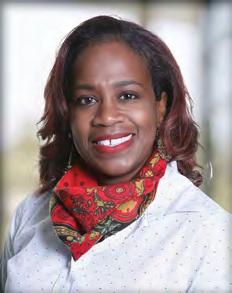
In the book of Jeremiah, the 9 th chapter, God says, “Call for the wailing women.” The sound of weeping and wailing breaks forth from Zion, the heart of God’s home in Jerusalem, weeping because of the violence and war which had overtaken the nation. They mourned the shame of being run out of the Promised Land, leaving their homes and tabernacles. Many of God’s people were raped, tortured, and killed, and this weeping was an outcry in hopes that God would see and hear their tears.
Violence and abuse are insidious and sneaky. They bring destruction to the strongest and most viable institutions, relationships, and people. Abuse erodes the fabric of that which is sacred, honorable, and divine. Unfortunately, abuse experienced and witnessed in sacred spaces is often overlooked, dismissed, rationalized, and results in victim shaming and blaming.
In this article, readers will encounter snippets of the stories of 5 African American pastors interviewed about their experiences as clergywomen in the Black Church, particularly the rural South. Their stories were collected as qualitative research for a domestic abuse and violence course at Shaw University Divinity School.
Patriarchy and misogyny have been present for more than a thousand years. Throughout the Old Testament, women were often viewed as property. Much of the commodification, violence, and dehumanization of women was allowed due to ancient biblical laws that promoted violence and victim blaming. Judges 19-20, Numbers 5, Ezekiel 16 and 23 all describe violence and abuse of women.
Abuse 1 (i.e., emotional, verbal, spiritual, physical, financial) is any form of oppression intended to punish or wound a victim so the oppressor gets the world the way they want it.
In the narratives collected, one female pastor was stalked and harassed by a community member resulting in the church building being defaced, a parsonage break-in, and personal property destroyed. After a disagreement during a church meeting, one female pastor was threatened, “I will bust you in the face, put my foot on your neck and let you bleed out until the ambulance comes.”
Female pastors disclosed that their supervising pastor/presiding elder (PE) would often align with the actions of church members or officers rather than offer support and advocacy for the pastor. This alignment occurred even in instances of bullying, harassment, and abuse. Of the women interviewed, two are no longer pastoring, one has retired 7 years early, and two left the institution of their abuse to pastor in other denominations.
According to Bessel Van Der Kolk, MD, in The Body Keeps the Score: Brain, Mind, and Body in the Healing of Trauma, trauma disrupts one’s nervous system and ability to cope. The survivor’s attempt to redirect the trauma by suppression can result in not only physical reactions (heart rate elevation, rigidity, rage, or defensiveness) but also physical symptoms such as fibromyalgia, chronic fatigue, and other autoimmune diseases 2 .
There are several methods Van Der Kolk describes as ways to address trauma within the context of abuse: professional therapy, art, music, and dance, as well as breaking the silence in naming and acknowledging the harm done. In Luke 18, we see a woman who breaks the silence. The widow refuses to conform and speaks out against the miscarriage of justice that would be deemed normal and routine in a patriarchal society. 3 Where women have been exploited, ignored, overlooked, and even abused, justice prevails when women refuse to stay silent!
What is most relevant, applicable, and tangible is that we can heal in community.4
In the ancient Near East, there was a profession passed down from woman to woman. The initiates or trainees were called “daughters,” and the guild directors were called “mothers.” It was the mourner’s guild, called “the keening or weeping women” in Jeremiah. These weeping women created space and community for the family and friends
1 Strickland, D. (2020). Is it Abuse? A Biblical Guide to Identifying Domestic Abuse and Helping Victims (p.24), P&R Publishing Company:
3 Bruggeman, W. (2018). Interrupting Silence: God’s Command to Speak Out. Westminster John Knox Press: Kentucky.
4 Van Der Kolk, B. (p.215) to grieve without embarrassment or feeling alone.
5 Manne, K. (2018). Down Girl: The Logic of Misogyny (p.63,68), Oxford University Press: New York.
As a Connectional church, there is the opportunity for ‘daughters’ and ‘mothers’ to come together; to weep and lament so that encountered trauma can be shared and released without embarrassment and shame. In the Old and New Testament, we find that the collective community performed weeping to commemorate sadness and provide emotional release. This collective mourning ritual allowed the community to heal itself after loss, grief, sin, and death. Those who wept understood that God would see and hear their tears in exchange for grace, forgiveness, strength, and God’s promise to restore, revive, and grant peace.
May we once again strengthen our collective shalom by no longer remaining silent, calling both mothers and daughters together in community, that we weep, wail, and break the silence of injustice against misogyny and toxic patriarchy.
Definitions:
Misogyny 5 is the law enforcement branch of a patriarchal order, which has the overall function of policing and enforcing its governing ideology. Misogynistic maneuvers range from ridiculing, mocking, vilifying, demonizing, and sexualizing to put women “in their place.”
Patriarchy 6 is described as the manifestation and institutionalization of male dominance over women and children in the family, which extends to male dominance over women in society. It implies that men hold power in all important institutions in society.
6 Lerner, G. (1986). The Creation of Patriarchy (p.239). Oxford University Press: New York.
The Rev. Tamara O. Kersey is an ordained itinerant elder in the Second Episcopal District of the AME Church. She is a 2013 graduate of the M. Div. program at Shaw University Divinity School, a board member of Democracy North Carolina, and associate pastor of Wayman Chapel AME Church in Graham, North Carolina.
Town Hall Meeting for Northwest Jacksonville Aff ordable Workforce Housing Development Project
On Saturday, April 1, at 10 a.m. at Greater Grant Memorial African Methodist Episcopal Church, located at 5533 Gilchrist Road, Jacksonville, Florida 32219, the Greater Community Development Corporation held a town hall meeting to unveil the housing development project called “Gilchrist Crossing.”
Gilchrist Crossing will feature townhome units with either 2 or 3 bedrooms and 2 baths. This development will be a build-to-rent-to-own community, empowering individuals to experience homeownership and legacy wealth building.
Gilchrist Crossing is a housing development led by Greater Community Development Corporation in partnership with Greater Grant Memorial AME Church, Local Initiatives Support Corporation (LISC) Jacksonville, Corner Lot Development, Performance Capital Partners, and others. It will provide modern affordable workforce housing in north Jacksonville, especially the Sherwood Forest community. This development also helps to underscore the concept of the church faith institutions-building community.
Greater Community Development Corporation is a new organization created to impact the community and region of the North and Northwest sections of Jacksonville, Florida. The ingenious leadership of Greater Grant Memorial AME Church birthed the entity as an operating entity that would align with the mission of the church, impact the greater community, and build greater residents.
Featured presenters included the Reverend Micah C. T. Sims, Sr. – senior pastor of Greater Grant Memorial AME Church & board chair of Greater Community Development Corporation, Dr. Irv Cohen – chief executive officer of LISC Jacksonville, State Rep. Angie Nixon – elected representative of the 14 th Legislative District Florida House, Thom Liggett – operating partner of Performance Capital Partners, and Mario J. Payne, CFP –TOAMS, financial and senior management of Corner Lot Development.
About Greater Grant Community Development Corporation
The mission of the Greater Community Development Corporation is to enhance and empower communities through development, projects, partnerships, and programs that develop greater opportunities to successfully improve housing, economic conditions, planning, sustainability, health, and the general well-being of the communities served. If we can help a community, an organization, or a region: G-Grow, R-Revitalize, E-Emerge, A-Achieve, T-Transform, E-Expand, R-Revolutionize, then we are willing to do it!









